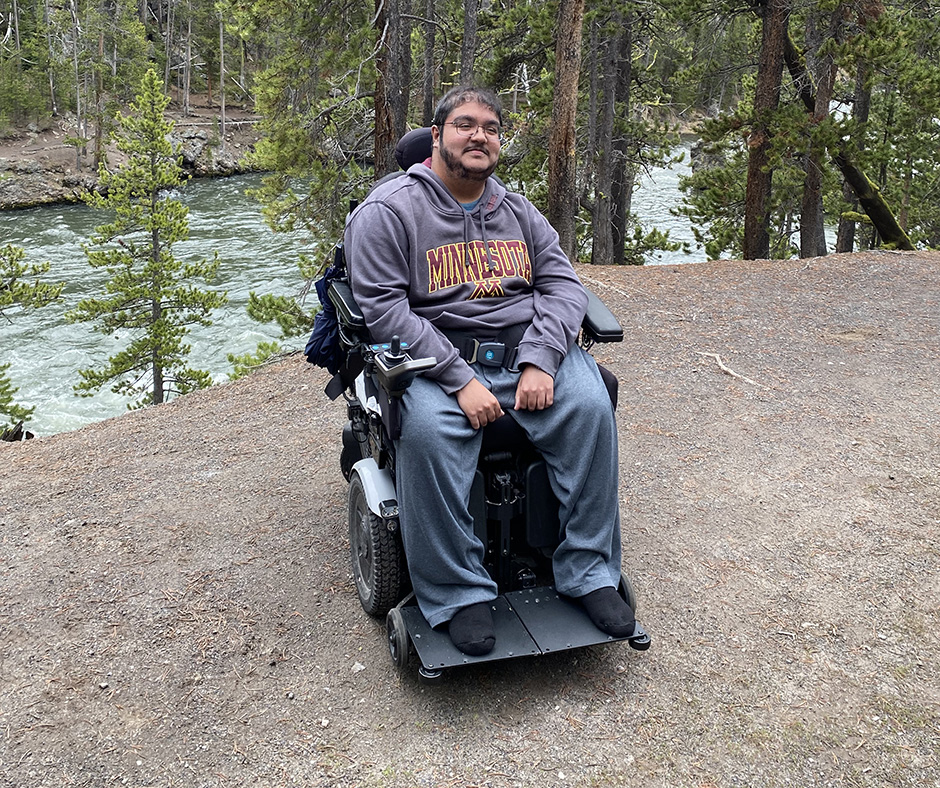 A post for International Day of Persons with Disabilities by Sumukha Terakanambi, Policy Consultant with the Minnesota Council on Disability.
A post for International Day of Persons with Disabilities by Sumukha Terakanambi, Policy Consultant with the Minnesota Council on Disability.
Read Sumukha’s first post in this series: International Day of Persons with Disabilities.
As the son of Indian immigrants, I have experienced how different cultures approach disability inclusion. Every summer when I was growing up, my parents would take my brother and me to their home city of Bangalore, India. I always looked forward to spending time with my grandparents and other relatives, catching up with friends, taking in the sights, and learning about my heritage. While I had many memorable experiences, I also faced my fair share of difficulties. As I got older and my disability progressed, I became more aware of the barriers that existed for people with disabilities in India. These experiences have shaped my perspective on disability inclusion. I believe that true inclusion cannot be achieved unless all countries continue to prioritize improving the lives of people with disabilities.
Lingering Attitudes Around Disability
Like many nations around the world, India is still grappling with negative attitudes surrounding disability. Unfortunately, people tend to view disability as something to be pitied or a source of embarrassment. In India, people with disabilities are often considered a burden, and expectations for them are generally low. I am fortunate to have relatives who are more open-minded, but there have been moments when I sensed some of them feeling sorry for me. Some relatives are also genuinely surprised that I have pursued higher education and am employed as this has not been the norm previously.
Disability Inclusion in India
India lacks the necessary infrastructure to support people with disabilities. There are no enforceable accessibility standards or community services in place to ensure that we can be fully integrated into society.
When I was around six or seven, my father considered moving us back to India to be closer to our family. My mother, concerned about how the move would affect me, asked my father to investigate the school system to see if any school could accommodate a student with a disability. Not only were many of them inaccessible, some administrators refused to even discuss the accommodations I needed.
Years later, I encountered many physical barriers whenever my family and I went out. For example, the sidewalks were several inches high with no curb cuts, and vegetable vendors would park their carts along the sidewalks, making it extremely difficult for me to walk even short distances to visit relatives. Most buildings had a flight of steps with no elevators or ramps. Taking the bus or other public transportation was challenging because there were no wheelchair ramps, and I struggled to climb into the vehicle. Often, my dad had to carry me just so I could get around.
The Importance of Disability Inclusion
These barriers eventually made visiting India more difficult, and I stopped traveling there entirely. It has been 12 years since my last visit. Given my need for mobility assistance and help with daily living, staying in India – even for a few days – would be impossible.
I have not seen or spoken to many of my relatives in years, which has made me feel like I am losing connections with much of my extended family. I have also missed out on several family events. Even my parents cannot travel together to visit on special occasions, as they are both my direct support professionals.
My story illustrates the importance of each country doing its part to protect the rights of people with disabilities. People with disabilities should be able to thrive no matter where they live. To achieve this, governments must implement and enforce accessibility standards and provide essential community services that promote inclusion. Another critical challenge is changing societal attitudes to normalize disability. We should expect people with disabilities to live independently, attend school, and contribute to their communities.
Addressing these barriers will positively impact the global community. Everyone, including people with disabilities, should have the freedom to travel, reconnect with family, experience other cultures, and pursue education and employment opportunities.